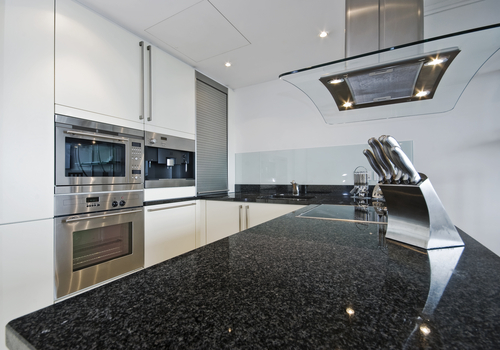Before you embark on your worktop journey, you would probably like to know more facts about the materials to help you decide which one’s right for you. We’ll compare granite worktops and quartz worktops and answer some questions you may have.
What is quartz? Is it hard-wearing like granite? Is granite porous? Does it scratch and stain? Is quartz cheaper than granite? We’re asked hundreds of questions like these and we understand that choosing between quartz and granite can be baffling – especially if you’ve been misinformed by an enthusiastic kitchen salesman, warning you of the ‘dangers’ of lemon juice and red wine. (They were probably fresh from a sales course somewhere!).
Here, I hope to dispel some of the myths associated with quartz, granite, silestone and other makes of solid work surfaces.
What is Granite?
Granite is a generic term for a volcanic rock that is granular in its composition. Granite is not necessarily a porous surface. Take Nero Assoluto, or Star Galaxy, two of our best selling materials. They are certainly not porous. We have Nero Assoluto worktops here at the Farm at Planet Granite. We installed these worktops over eight years ago, they’re in constant use every day and they look exactly the way they did when they were new.
We really have used and abused our granite worktops daily, but they’re still perfect! So much so, you would be forgiven for thinking they were brand new, when in fact they are around 500 million years old! We do not use a chopping board – the entire worktop is a chopping board! It is a surface to work on, cutting up your dinner, chopping vegetables – it’s a work surface after all.
What is Quartz?
Quartz worktops, such as Silestone, Caeserstone , Unistone and such brands, tend to be around 93% natural quartz stone, so they’re classed as a man-made stone. The main benefit of quartz is to do with personal preference to colour more than anything. With quartz, it’s possible to achieve pretty much any desired colour or pattern. If it’s pink and sparkly, or bright red, or pure white, then quartz it is.
Another benefit with quartz is that if you’re after a light-coloured material, it has non-porous properties due to the polymer additives used by the manufactures. This is where a quartz stone is, perhaps, more suitable than a light granite that would be slightly porous.
As a general rule, the lighter the granite, the more susceptible to staining it is. However, a large majority of the granite we install tends to be darker, and not as porous. In short, saying that granite is porous is not true. There are so many different types of granite, all of which have different properties.
Is Quartz Cheaper than Granite?
The short answer is no. The prices of granite and quartz cross over. There are some very expensive quartz colours, such as the Silesone Fernando Alonso. It’s by no means cheap, but once you see it, you can see why: it exudes quality and is certainly expensive to produce.
Granite on the other hand has already been produced by nature, yet requires enormous manpower and engineering to excavate and process into the slabs we use in worktop manufacturing. Generally, a customer would not opt for granite or quartz based on price per square metre. The decision would be based on personal preference and the overall look they wanted to achieve. At Planet Granite we charge the same price for Star Galaxy granite as we do for Black Sparkly mirror fleck quartz, so really it’s down to personal preference.
We hope this answers some of the questions you may have about granite and quartz. If you need more assistance, please contact us using the details at the bottom of this page.
Hi, I’m Steve. I run Planet Granite from a custom-built farm in Warwickshire, where I live with my family. The team and I are really passionate about crafting and installing granite and quartz worktops, as you’ll see from my blog. You’ll find before and after photos and examples of different designs and stone to inspire you. Happy reading!







